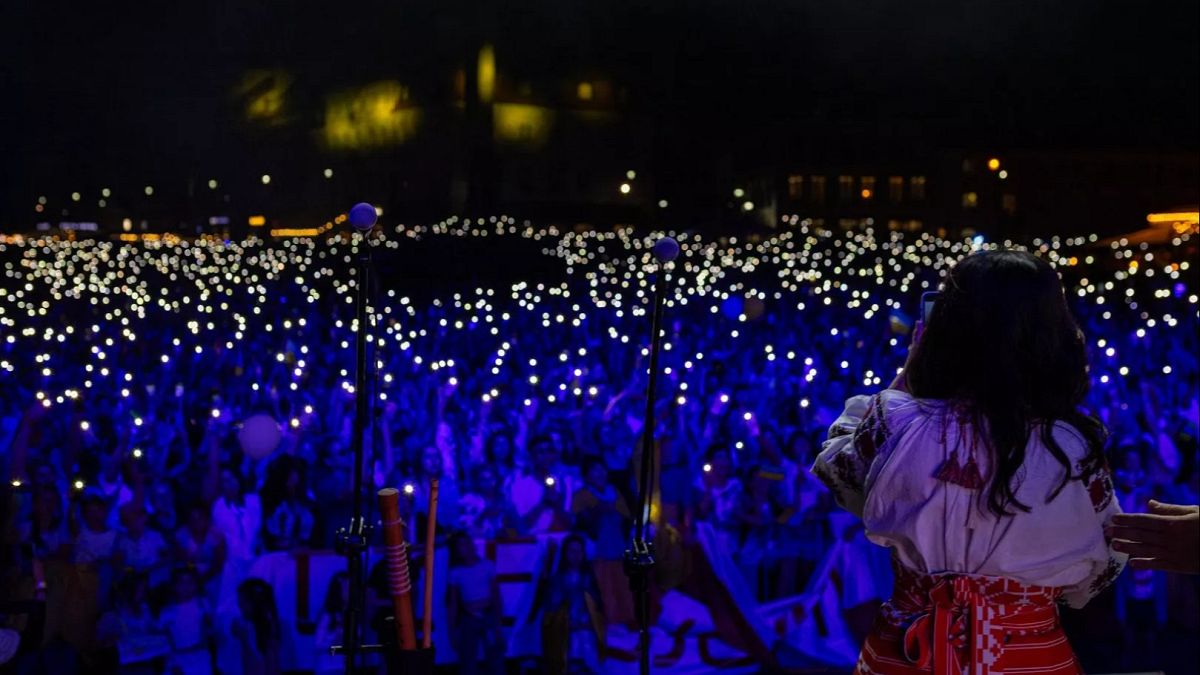24 August marks Ukraine’s Independence Day. A holiday that has recently had a bittersweet taste for Ukrainians residing in Poland and other countries.
Natalia Panchenko, leader of Euromaidan Warsaw and co-organiser of Ukraine’s Independence Day celebrations in Warsaw, tells Euronews:
“We are the generation that is dying for Ukraine to continue to be independent. That is why this day is especially important for us. This day is important for those who are fighting in the trench, because it reminds them what they are fighting for – for Ukraine to be independent. This day is important for the mothers who lost their children in this war and for the families of those in Russian captivity. This is a day we used to celebrate in Ukraine with big festivals, concerts, celebrations in central squares, in all cities. But for the last 12 years we can no longer rejoice, because for the last 12 years we have been forced to fight with Russia every day for this independence.”
Flows of Ukrainian refugees in Europe
UN figures show that there were 5.6 million citizens living outside Ukraine on 1 July 2025. At the same time, according to the International Organisation for Migration, 4.14 million Ukrainians who left at the beginning of the war had already returned to their homeland by 1 April this year.
The National Bank of Ukraine, on the other hand, forecast in a recent report that the pace of Ukrainians’ return to Ukraine is slowing down. Instead of the expected 500,000 Ukrainians who were expected to return to the country by 2027, it now predicts only 100,000. At the same time, the NBU forecasts a new wave of emigration – up to 400,000 people in 2026-2027.
According to Natalia Panchenko, there are currently around 2.5-3 million Ukrainian citizens in Poland, of which roughly one million are war refugees since the full-scale invasion of February 2022. As the Ukrainian activist points out, the Independence Day celebrations are also an opportunity for the Ukrainian community to thank all those in Poland and Europe who support them:
“Poland differs from other countries in that when the war started, it was not only the state, the institutions and the system that acted. Above all, it was ordinary people who joined in, who drove to the border to pick up refugees, who opened their own homes to take them in, who supported women from Ukraine and helped enrol children in schools and kindergartens. Polish society in general is something of a phenomenon to me. Even now, when some people are already tired of helping Ukraine or simply that the war has lasted so long, despite the fact that economic conditions have worsened in Poland, so you have to take care of yourself – there is still a huge number of Polish organisations and ordinary people who collect humanitarian aid, go to the front, and support refugees.”
At the same time, the activist does not hide the fact that during the last election campaign in Poland, there was more hate speech including anti-immigrant and anti-Ukrainian slogans. She admits that recently she has been hearing more often from Ukrainians in Poland that they feel less safe and are considering leaving. But it is not always a return to Ukraine, but often further emigration to the West.
A scorched earth awaits many Ukrainians returning home
In the spring of 2025, the Gremi Personal Analytical Centre conducted a survey among Ukrainian citizens temporarily residing in Poland. The results showed that 70% of respondents are potentially considering returning to the country. Of these, 17.9% said they would return immediately as soon as it was safe to do so, while 45.3% were hesitant but would not rule out a return.
“In terms of forecasts, further migration dynamics will depend primarily on developments in Ukraine: scenarios for the end of the war, economic recovery, the scale of investment and other factors. Although the demographic situation in Ukraine is indeed a cause for concern, the potential for return remains significant, especially in the long term”, Oleg Rudenko of the Gremi Personal Analytical Centre believes.
According to Nataliya Panchenko, it is certain that some Ukrainians staying in Poland and Europe will not return to their country even after the war is over.
“It is primarily those people in Ukraine who already physically have nowhere to return to. It is very often the case that people not only do not have their home, but they no longer even have the town they came from. If you take towns like Avdiyivka or Bakhmut, or many others, and look at a map today, there is just a black, scorched earth.”
On the other hand, some of the refugees are already returning now, without waiting for a ceasefire or peace talks, so that from September children can start the new school year already in Ukraine.
“About 40 per cent of the refugees who are currently abroad are planning to return to Ukraine. Regardless of the fact that some of them are already well anchored have friends, they indicate that they do not have a sense of home here and that they will want to return to Ukraine at the first opportunity”, Panchenko concludes.

